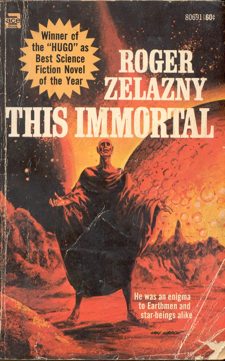This Immortal, or “And Call Me Conrad” was Roger Zelazny’s first novel, and it showcases a lot of the things that he typically did. It’s unquestionably science fiction, but it uses mythic resonance in a way more familiar in fantasy. It has a first person smartass hero, wisecracking his way across the adventure. It’s fast moving and builds the world up as a neat piece of juggling—and of course, it’s poetic and beautifully written. I can see some people hating Zelazny for the very things I love about him—the style, the prose, the offhand worldbuilding. It doesn’t always work for me. But when it does, as here, it’s lovely.
In This Immortal it’s Greek mythology, and Greek folktales too. In the first line, Conrad is accused by his wife Cassandra (who is, naturally, always right and never believed) of being a kallikanzaros—one of the demons who try to destroy the world and are scared away by the Easter bells. He’s tall and hairy with one leg shorter than the other and he somehow just doesn’t seem to age. This is because there was a nuclear war on Earth, the “Three Days” and there are a whole lot of mutants around, especially near the “hot places” that are still radioactive. There are also a whole lot of alien tourists, and Conrad’s job involves taking one of them on a tour of beautiful but devastated Earth, while other people, human, mutant, and alien, seem desperate to kill him.
No plot spoilers.
There’s a complicated backstory—after the nuclear war, the colonies on Mars and Titan had to manage on their own. They were rescued by blue-skinned humanoid aliens from Vega, who took them to their planets, even though the presence of humans detracts from the value of real estate, cheap sentient labour and entertainment makes it worth it. Meanwhile, Earth has a lot of mutants, a civilization based on the less-damaged islands, and the only thing that’s thriving is the tourist trade as bored Vegans visit to be entertained. Conrad’s been trying to save the world, or possibly destroy it, for a long time now. The exiled human population are a problem, having their own agenda, and the Vegans want resorts and seem to see all humans as whores.
What we have here is a picaresque in the traditional old fashioned sense—the characters go from place to place and encounter and overcome dangers while we learn about them and about the world. Zelazny gives us enough of all three things—the encounters, the characters and the world—to keep us fascinated and tantalised. There could always be more. The end is something of a deus ex machina, but in a way that fits very well with everything that has gone before. There are moments in this book that are as good as anything Zelazny ever wrote—getting a telepathic flash of being in the alien’s mind and seeing ultra-violet colours in a white flower, fighting a boadile and wondering how many legs it has, Hasan saying the devil has forgiven him.
Jo Walton is a science fiction and fantasy writer. She’s published two poetry collections and eight novels, most recently Lifelode. She has a ninth novel coming out on January 18th, Among Others, and if you liked this post you will like it. She reads a lot, and blogs about it here regularly. She comes from Wales but lives in Montreal where the food and books are more varied.










